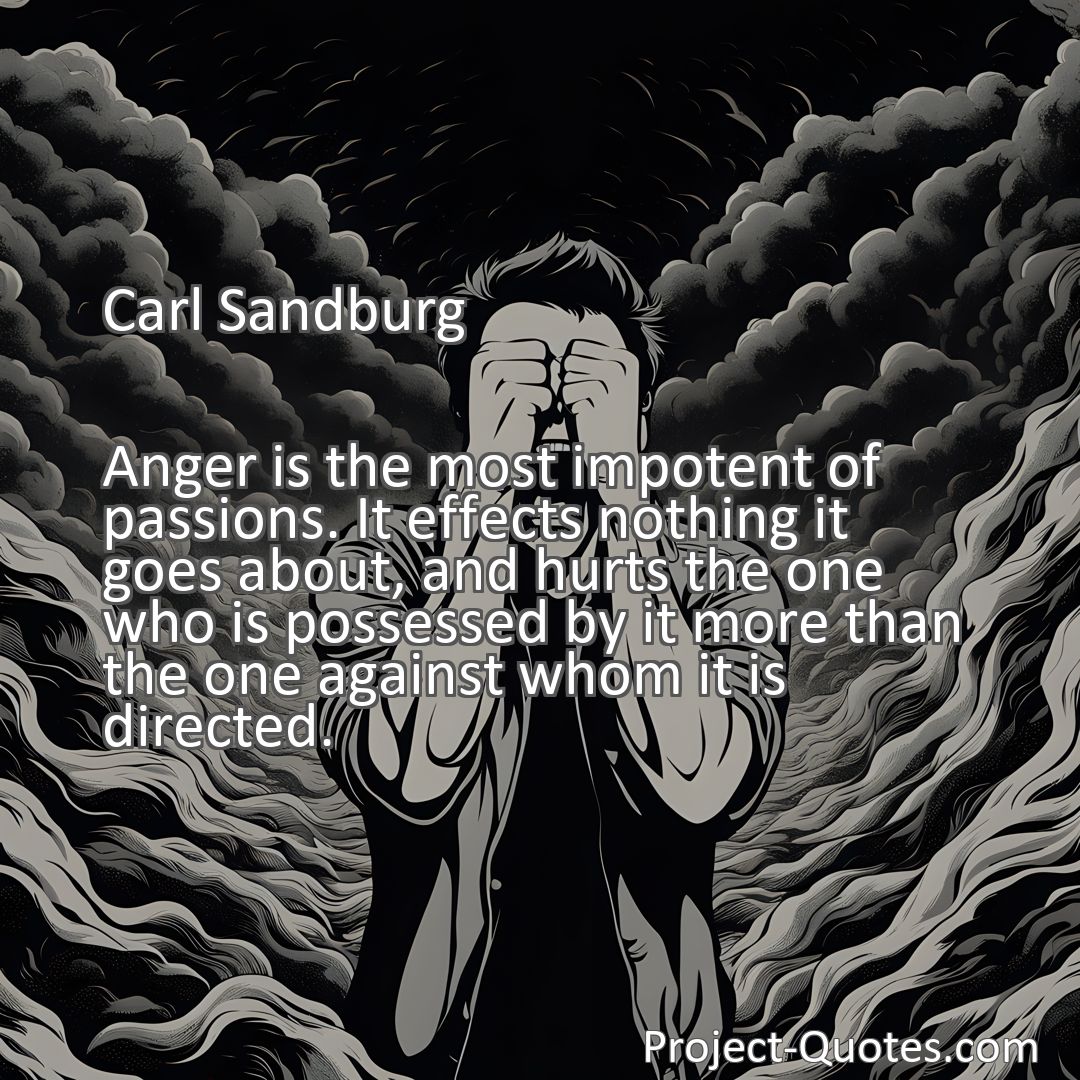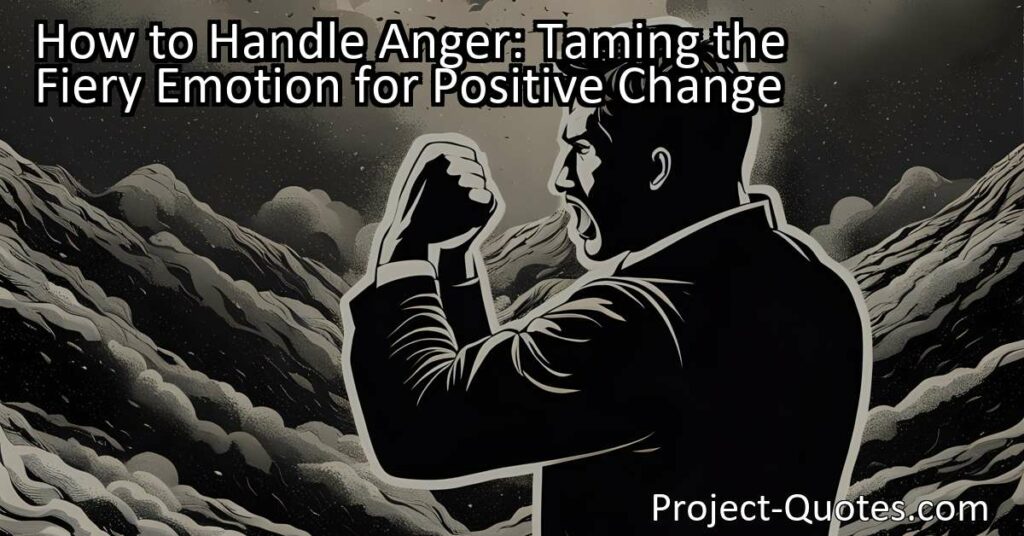Anger is the most impotent of passions. It effects nothing it goes about, and hurts the one who is possessed by it more than the one against whom it is directed.
Carl Sandburg
How to Handle Anger: Taming the Fiery Emotion for Positive ChangeAre you familiar with that feeling of anger where you thought steam might actually start puffing out of your ears? Well, that’s anger! It’s a normal emotion, but what’s important is how we handle it. In this article, we learn how to tame anger and make positive changes by taking a break, talking it out, being a detective about our feelings, getting creative, and looking for solutions.
Table of Contents
- 1 Anger is the most impotent of passions. It effects nothing it goes about, and hurts the one who is possessed by it more than the one against whom it is directed.
- 2 Carl Sandburg
- 3 Meaning of Quote – Anger is the most impotent of passions. It effects nothing it goes about, and hurts the one who is possessed by it more than the one against whom it is directed.
- 4 Freely Shareable Quote Image
- 5 Related
Meaning of Quote – Anger is the most impotent of passions. It effects nothing it goes about, and hurts the one who is possessed by it more than the one against whom it is directed.
Have you ever felt so angry that you thought steam might actually start puffing out of your ears like in cartoons? Well, you’re not alone! Anger is that hot, fiery feeling that bubbles up inside when things don’t go our way, or when someone is unkind, or when we feel like something just isn’t fair. We all get angry sometimes it’s a totally normal emotion! But what we do with that anger is what really matters.
Carl Sandburg, a wise poet, had something interesting to say about anger. He said, “Anger is the most impotent of passions. It effects nothing it goes about, and hurts the one who is possessed by it more than the one against whom it is directed.” That’s a bit of a mouthful, huh? Let’s break it down and think about what he meant.
When he says anger is “the most impotent of passions,” he’s not talking about anger doing push-ups or trying to be strong. “Impotent” here means it doesn’t do much to solve problems or change situations. You can think of your anger like a car with a loud engine but no wheels it makes a lot of noise but doesn’t actually go anywhere.
Let’s say your brother or sister breaks your favorite toy. You might yell and scream, or perhaps stop talking to them. That’s your anger roaring like that engine. But does the shouting stick the toy back together? Does giving the silent treatment fix the broken pieces? No, it doesn’t. Your anger hasn’t changed anything about the toy; it’s still broken.
Now, what about the second part: “It hurts the one who is possessed by it more than the one against whom it is directed”? This means that when you’re boiling mad, it’s actually you who can wind up feeling worse. Being angry is like holding onto a hot coal with the intention of throwing it at someone else; you’re the one who gets burned. The person you’re angry at may not even realize how upset you are, or they might not feel as bad as you think. Meanwhile, you’re all worked up, which could make you feel physically uncomfortable (headaches, stomachaches, or just plain exhausted), and emotionally worn out too.
Imagine a time when you were super angry. Maybe your face got red, your heart raced, and you couldn’t stop thinking about what made you mad. It might have ruined your whole day all because of anger! So you see, holding on to anger can be a lot like carrying a heavy backpack filled with rocks around all day. It’s tiring and doesn’t help you enjoy your day or do your best.
The thing is, anger can trick you. It makes you feel powerful for a second, like you could win an argument or make someone understand how wrong they are. But usually, it does the opposite. It makes people not want to listen and often leads to more arguments rather than solutions. Imagine trying to listen to someone who’s yelling at you it’s pretty tough, isn’t it?
So, what are we supposed to do when that anger rises up like a fiery dragon inside us? Here are some ideas:
1. **Take a Break:** If you’re really heated, give yourself some time away from whatever is making you mad. Count to ten, breathe in and out, go for a walk whatever helps calm that fire-breathing dragon inside.
2. **Talk it Out:** When you’re feeling a little cooler, try talking to someone about what made you angry. Using words can help you sort through your feelings and maybe even find a way to fix what’s wrong.
3. **Be a Detective:** Get curious about your anger. Ask yourself, “Why am I so mad about this?” Sometimes, understanding why you feel a certain way can take away some of the power of the emotion.
4. **Get Creative:** Some of the best music, art, and stories come from strong feelings like anger. Channeling your energy into something creative can help you express what you’re feeling in a productive way.
5. **Look for Solutions:** Instead of stewing in your anger, think about how you might solve the problem. Broken toy? Maybe you can fix it or save up for a new one. Upset about a rule at school? Perhaps you can talk about it with a teacher or suggest an alternative.
Thinking about Sandburg’s words and what we talked about, it’s clear that anger itself isn’t the bad guy it’s a normal feeling that alerts us when something’s not right. What counts is how we deal with it. We can let it control us, like a wild horse pulling us along, or we can learn to tame it and use it to make positive changes.
Remember, it’s okay to feel angry, but it’s not okay to let it hurt you or others. By finding helpful ways to handle anger, you’ll be healthier, happier, and more in control of your own feelings. The next time you feel that hot air balloon of anger starting to float up, think about Sandburg’s quote and ask yourself if letting anger take the reins is really worth it. Chances are, you’ll decide to let some air out of that balloon and handle things in a way that makes you feel powerful for real by being kind, patient, and super smart about your feelings!
I hope this quote inspired image brings you hope and peace. Share it with someone who needs it today!


